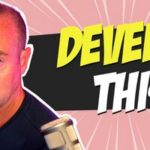How good is your follow-up? You know, in the mid 90s, I was a sales professional. And as part of my role, I wanted to be the best I could be. I used to buy and read and implement a lot of books. And then I went on this phase of, Okay, who’s good at selling? Who can I learn from? And one of the fields that identify that does well with selling, who can get in some cases, billions of people to follow their advice, is the religious-type organizations.
So I went and purchased a copy of the main guide from each of the organizations. You know, the Quran, the Bible, the book of Mormons. And this book, this book is called Dianetics. And it’s by L. Ron Hubbard, who was a science fiction writer who came up with his own sort of organization, which you may have heard of, called Scientology.
I am not a Scientologist. This is not about whether you are religious or not. But what this video is about, is about follow up, because I bought this book in 1998. I’m recording this in 2021. So we’re talking about 23 years ago. And every single year, multiple times per year, I get a little envelope in the post with my name on it, handwritten, from the Church of Scientology. They send me little brochures and flyers and things. They keep me up to date with offers, I suppose.
Now the open rate for mail these days is very high, because we don’t get many envelopes that aren’t bills. In fact, we don’t get bills. They’re all electronic, so it’s usually only subscriptions. Like you get your coffee subscription or your surfing magazine if you still do print media, the occasional old school thing, and an enormous amount of real estate spam.
Anyway, they sent me this handwritten letter in here and it says, Dear James, how are you doing? Some time ago, you purchased a book of Dianetics, good on you. “Some time ago,” dude, that was 23 years ago! Are you still living at the same address? Yeah, I guess I’m in. It’s a PO Box so I’m not literally living in my PO Box, it redirects to my house, but it always blows me away.
Every time I get that letter, I think, how easily do people give up with the follow-up? When I was a professional salesperson, I was at the top of my field. I was the number one in Australia for two different luxury brands – BMW and Mercedes-Benz. And I still write handwritten letters. When people would come and visit me, I’d follow up with handwritten letters. I would cut out little magazine snippets, just like these people, and send it to the clients. And I would let people know when it’s time to change and so forth, send them different offers.
Are you using the print media? Are you using physical letters sent to people’s houses? Lumpy mail, as you want to call it. Do you collect physical addresses from people in your database? Because if you’re not sending out things to people’s houses… Now, unfortunately for them, I suppose it’s not going to convert me into being a Scientologist. It will never work. It doesn’t matter if they send me stuff for another 20 years. I’m not convinced that’s the one for me. But I’ll give him credit for persistence. And if I was not a very strong fortified sales-minded person and understanding what’s happening, I could over time be persuaded or moved. But certainly no one else is sending me anything from all the other major organizations. They’re not sending me stuff. They occasionally visit my door. But I usually try and sell them a website because they really need it, if that’s their only channel.
But I think the mail is a missed opportunity. Get into sending out letters. I still send out physical things. I literally send my book to people every single day. And it’s got high cut-through. I’m a big believer in books. I’m a big believer in educating yourself. I’m a big believer in follow-up and trying channels that aren’t as popular. It’s not as sexy to talk about sending letters right now. So that’s why you should be doing it.
I’m James Schramko. I hope you’ve enjoyed this tip today.
See our products here









Leave a Reply